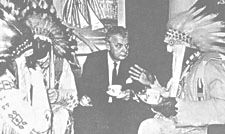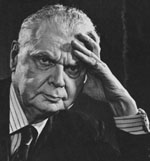By Bob
By Bob
Dief and Me

John Diefenbaker was Prime Minister of Canada in the mid-1960s, the first westerner to hold the job. He was an old-fashioned, thundering, Tory populist. I wrote this piece for what would have been his 100th birthday.
My connection to John Diefenbaker began in 1974, on the night Muhammad Ali became the first man to regain the World Heavyweight Boxing Title. I watched the fight on TV in Bob Rae's small, off-campus Toronto apartment. Yes, that Bob Rae. Bob was very impressed by Ali's victory. He mused that Floyd Patterson could now return to beat Ali, Marilyn Bell could re-swim Lake Ontario, and Dief could be the chief again.
Thus was my song Dief will Be the Chief Again first conceived.
At that time, John Diefenbaker was merely a former prime minister, not the Canadian Icon he was to become. Only As It Happens, the radio show, had begun mining the Diefenbaker seam. So as soon as Dief will Be the Chief Again was on tape, I fired it off to As It Happens. The next night it was reviewed on the air. By John Diefenbaker.
"It's a real barn-burner, isn't it sir?" said Al Maitland.
I sat in the kitchen, glued to the radio. "Well, Mr. Diefenbaker?" said Barbara Frum.
"As a connoisseur of good music," Dief replied, "I am simply delighted."
Not everyone was. Left-wingers liked the song, as did right-wingers, though for different reasons. Some far-left friends disapproved, and so did the Victoria Times-Colonist in an editorial. The mayor of Yorkton, Saskatchewan, a Conservative, ordered a stack of copies. I don't recall any Liberal opinion at the time, though later when my band, Stringband, was invited to Ottawa to sing at a state occasion, I asked how the song might be received. "Not well," I was told.
But that first night on As It Happens, Al Maitland predicted, "It's going to be a hit."
It wasn't. No record company would take it. "Too Canadian," said the president of one US subsidiary. "The radio stations won't play it," said the head of a Canadian company. Undaunted, we pressed the record ourselves and sent it to the stations. They didn't play it.
A few did: CKBI, Prince Albert, for instance, sent a note saying it was number one with them. The Toronto Sun got wind of this and wrote that Dief Will be the Chief Again was the number one hit in Prince Albert. Other papers picked up The Sun's story. You know how, when you are a kid, you dream of having the number one hit song? Well, it's not like that.
A few months later, on September 18, 1975, Diefenbaker turned 80. He was in Saskatoon. So was Stringband. He was the guest of honor at a party in the Centennial Auditorium. We were the band at the Parktown Motor Hotel. We weren't invited to the party, but at the Parktown, a bar full of hippies drank to the days when, as my song went, "there was law in the land and order in the home." A man with waist-length hair passed out candles and everyone sang Happy Birthday.
The next day I got a message from CTV. W5, the network's flagship public affairs show, was going to interview Diefenbaker by a special hook-up from Saskatoon and they wanted to fly us to Toronto to sing our song. It would then be carried back to Dief by satellite. So we flew from Saskatoon to Toronto to play for Diefenbaker in Sakatoon. While we sang we watched him listening, in close-up, on a 10' by 10' screen. He chuckled enormously. At the end of the segment, the host said, "Mr. Diefenbaker, I hope we speak again like this on your 90th birthday." Dief replied, "I don't see why not. You look well."
That mediated encounter was the closest Dief and I ever got. However, reports continued to filter back: "Dief hums the song all the time"; "Dief says the song is right, you must never write off a good man too soon."
But then something happened. In a later interview, Diefenbaker's comments were guarded. "Over the years there have been a lot of things written about me," he said. "Some have been unkind, some have been flattering. I don't know about that particular song." My mother caught the interview and called me. "Honey," she said, "I think he's on to us."
There are things that weigh on one, however slightly. Since then, I have always wondered what Diefenbaker heard, or was told or decided. Though, of course, I never found out.
I last heard my subject confronted by his song in the late 1970s on Morningside, during another birthday tribute. Don Harron asked Dief what he thought. "I have no comment," he said, with the thorough finality of a man who had spent over 80 years on the earth, 60 of them in politics.
